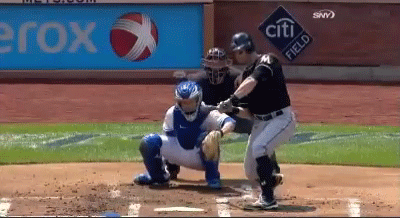
Why is it generally viewed as preposterous for the Tigers to part with Max Scherzer while the Mets were heaped in praise for dealing R.A. Dickey?
Max Scherzer had a great season in 2013. As a result, he won the Cy Young in the American League. There were some other worthy candidates; however, by all accounts, Scherzer was highly deserving of the career-defining accolade.
And yet, despite that fact, rumors have surfaced that the Tigers may look to move the 29-year-old righthander on the heels of his career season. A strange notion on its face, though Mets fans can understand the logic of such a move better than most: Maximizing the returns from a pitcher whose value will likely never be higher, who also happens to be entering his walk year and looks poised for a material salary bump?
Yeah, you could say the Mets navigated those waters to some pretty good success last winter. (see, the club's current number one and two prospects).
That's not to say that they aren't contentious waters. But even for the staunchest critics of such inherently unpopular moves it's hard not to see the merit. That said, the discussions revolving around trading Scherzer have a markedly different tenor than those of the Mets' former Cy Young winner in 2012.
Specifically, while Mets fans were sad to see him go it became clear early in the offseason that trading the immensely popular R.A. Dickey was likely the right move. As previously stated, it's hard to fault the logic of selling an asset at it's zenith -- which Dickey clearly was -- so late in the contract cycle.
What is interesting is that the overarching sentiment this time around lacks the same general approbation, with most criticizing or completely writing off a similar sell-high approach with Scherzer. In short, a Scherzer trade is considered, at best, hot stove sensationalism. So why the drastic difference this winter?
On the surface the value proposition of a Scherzer deal is the same -- with the same inherent assumption that Tigers general manager Dave Dombroski only makes said deal upon return of a pile of top prospects, much like Sandy Alderson was able to parlay. Like Dickey, Scherzer is at the peak of his value posting career bests in ERA, WHIP, K/BB, and innings pitched in 2013. He is also a year away from free agency.
Obviously the ages vary -- Dickey was 37, Scherzer turns 30 next season. However, that difference is made less glaring by the fact that the older man is also that ageless species of pitcher known as a knuckleballer.
So why the drastic difference of opinions when it comes to dealing them?
I think the general tone was captured best by MLB Network analyst and former major league pitcher Mitch Williams when he stated that -- and I'm paraphrasing here -- both pitchers had great seasons, but Dickey's success came with a good degree of luck while Scherzer's was the genuine article. As a result, the Mets were smart to strike while the iron was hot -- i.e., before Dickey could revert back to his true level of talent -- while the Tigers would be unwise to deal a 'true ace'.
Fortunately -- and likely to the erstwhile closer's surprise -- we have at our disposal a number of relatively effective proxies for pitcher's luck. Specifically, as we have come to learn in recent years good fortune tends to reside in any of three places on the pitching stat sheet: batting average on balls in play, home run per flyball, and left on-base percentage.
Therefore we can get a pretty good feel for the amount of luck that may or may not have favored Dickey and Scherzer in each of their respective award-winning seasons:
Dickey
| Season | BABIP | HR/FB | LOB% |
|---|---|---|---|
| 2012 | .275 | 11.3% | 80.0% |
| Career | .301 | 11.3% | 73.6% |
Scherzer
| Season | BABIP | HR/FB | LOB% |
|---|---|---|---|
| 2013 | .259 | 7.6% | 74.4% |
| Career | .302 | 10.4% | 73.7% |
As we can see above, they both showcased a fair share of what we generally identify as luck (though in the case of pitchers pitching at their best, as they have to to win the Cy Young, one could make an argument for some skills improvement. Neither here nor there.) Neither one, however, exhibited significantly more luck than the other -- though the case can be made that if we had to select one it was likely Scherzer, not Dickey, who benefited more from some good fortune*. So what else is going on here that is driving the disparity between these two trades?
In my view, it pretty clearly goes back to that idea of Dickey as a knuckleballer. It was a layer of criticism he had to combat throughout the 2012 season . He just doesn't look like a Cy Young. The words 'trick pitcher' came up more than a few times that summer. And yet, he overcame that unfair critique to bring home the award. And he deserved to.
Yet here we are once again, labeling -- and worse, valuing -- players based on our eyes, not our heads. Despite the fact that we have numerous indicators at our disposal that all point to Scherzer benefiting from lady luck as much -- if not more -- than Dickey we still pray at the altar of velo.
It's not unfair to suppose that, contrary to Dickey, Scherzer has an inherent advantage when he is evaluated based on his pitching style. He looks every bit the part of a Cy Young, an ace. He throws hard. He doesn't just fool people, he blows them away too. And he would certainly look a hell of a lot better in a pair of Gloria Vanderbilts than would Dickey.
In short, people like this:
...more than they like this:
...even if analysis of the actual performance tells them not to. It's the allegory of the grade school quarterback: The popular, handsome kid is always going to get more shots than the goofy outcast, almost regardless of talent.
And yet, despite what our eyes might have told us, Scherzer experienced some luck. We know this. We know this thanks to an extremely high level of discourse and analysis that surrounds today's game. It's a tool, or set of tools, that are at our fingertips, just itching for us to raise the intellectual high-water mark.
But the truth is wily and elusive; just when you think you've got things figured out, it finds another way to shroud itself, providing refuge for the old guard. That's why it's important to remain ever vigilant, even against our own latent biases. After all we don't want to go back to selling jeans now, do we?
*We can make this statement based on the fact that, in general, the most heavily-weighted factor when culling out luck -- say, to calculate FIP -- is HR/FB. Dickey received absolutely no good luck in this area while Scherzer saw his own home run figures improve by nearly 30% from his career norms.

